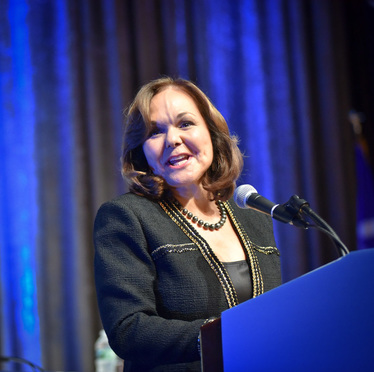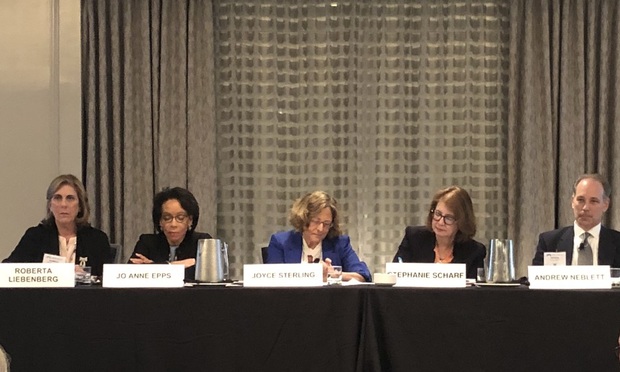Women Partners, Law Firm Leaders Have Vastly Different Big Law Lives, Study Shows
A new American Bar Association analysis shows that men and women experience life at large law firms vastly differently. The data underscores what the ABA hopes will be the first step toward changing that.
August 03, 2018 at 06:20 PM
5 minute read
 American Bar Association headquarters in Chicago
American Bar Association headquarters in Chicago
If you ask women partners, law firm life is not all it's cracked up to be. If you ask managing partners, things are going just fine for women in Big Law.
That's one large takeaway from a study commissioned by the American Bar Association that was aimed at making recommendations on how to stem a “gigantic talent drain” as women leave the legal profession much more quickly and in larger numbers than men. A study of lawyers at Am Law 200 firms by ALM Legal Intelligence shows that while 44 percent of 2015 graduates are women, a mere quarter of graduates from 1991 are women.
The results of the study, which included more than 1,300 participants from the nation's 350 largest law firms, were partially released Friday at an event at the ABA annual meeting in Chicago. The survey's most stark divisions between men and women had to do with how the two groups experienced harassment and gender bias. But they also generally showed a vast disconnect between female and male partners, and specifically women and managing partners, about their experiences in Big Law.
Nearly half of women—49 percent—reported receiving unwanted sexual conduct or contact. For men, that number was just 6 percent. Nearly three-fourths of women—or 74 percent—had experienced demeaning communications, while only 8 percent of their male colleagues reported the same. Eighty-one percent of women had been mistaken for a lower-level employee; zero percent of men said that happened to them.
More than half of women, 54 percent, said they had been denied a salary increase or bonus. Four percent of men said that happened to them. And 51 percent of women said they had felt “treated as a token,” while only 1 percent of men said they had ever felt that way.
As for the difference between women partners' and managing partners' experiences in Big Law, 80 percent of managing partners said that law firm leaders were “active advocates” for advancing women within firms; 61 percent of women agreed. Three-fourths of managing partners said firms promote women into leadership positions; 54 percent of women agreed. Seventy-nine percent of leaders said gender diversity is a priority at their firm; 54 percent of women agreed.
As for promoting women into equity partnerships, 71 percent of firm leaders agreed firms were doing a good job. Among women, the number was 47 percent.
 ABA president Hilarie Bass.
ABA president Hilarie Bass.The survey was commissioned by ABA president Hilarie Bass, who is co-president of Greenberg Traurig and has spent more than 25 years in Big Law.
“The longer I do this, the more frustrated I have become that we continue to have to ask these same questions: Why are there so few women who make it to the level of equity partner? Why are there so few women on compensation committees? Why are there so few women managing partners?” Bass said Friday. “It really begs the question of what we need to do to have more women in these upper levels, if in fact almost half of women have left by the time they're 50.”
Toward answering that question—why women leave their firms—the survey asked about men and women's general level of satisfaction within Big Law.
Compensation was a large point of divergence: 69 percent of male partners were satisfied with the firm's compensation methods, compared to 44 percent of women. While 71 percent of men said they were satisfied with the recognition they received for their work, 50 percent of women agreed.
The survey also asked lawyers with more than 20 years of experience about aspects of men and women's lives outside of Big Law. The survey found stark differences on that score as well.
For instance, 54 percent of women had responsibilities for arranging child care, compared to 1 percent of men. Forty-two percent of women reported having responsibility to do laundry, compared to 8 percent of men. While 34 percent of women reported they often leave work for their children's needs, only 5 percent of men said they did the same.
The survey is meant to be a springboard for recommendations that Bass hopes will at some point be brought to the ABA House of Delegates to encourage law firms to take active steps to retain senior women partners.
Those steps have not been formally agreed upon yet, but Stephanie Scharf, a former Jenner & Block and Kirkland & Ellis partner who is now a name partner at Chicago's Scharf Banks Marmor, said many of the suggestions will be aimed at changing law firms. (Scharf serves as chair of the ABA Commission on Women in the Profession and took part in conducting the survey.)
“In looking at the parameters where women are much less satisfied than men, all of those factors are pretty much within the control of the law firm,” Scharf said. “We did not see differences in opinion [between men and women], for example, on the challenge of your work or the individual responsibility of your work. I underline that because I do believe this is within control of the employers.”
The official survey, which was done in conjunction with ALM Legal Intelligence, is set to be officially released around Labor Day.

This content has been archived. It is available through our partners, LexisNexis® and Bloomberg Law.
To view this content, please continue to their sites.
Not a Lexis Subscriber?
Subscribe Now
Not a Bloomberg Law Subscriber?
Subscribe Now
NOT FOR REPRINT
© 2025 ALM Global, LLC, All Rights Reserved. Request academic re-use from www.copyright.com. All other uses, submit a request to [email protected]. For more information visit Asset & Logo Licensing.
You Might Like
View All

Latham's Lateral Hiring Picks Up Steam, With Firm Adding Simpson Practice Head, Private Equity GC
3 minute read

Eight Years On, A&O Shearman’s Fuse Legal Tech Incubator Is Still Evolving
4 minute readTrending Stories
- 1PayPal Faces New Round of Claims; This Time Alleging Its 'Honey' Browser Extension Cheated Consumers
- 2Fired NLRB Member Seeks Reinstatement, Challenges President's Removal Power
- 3NY Inspector General Announces Attorneys Hired to Lead Upstate Region and Gaming
- 4Carol-Lisa Phillips to Rise to Broward Chief Judge as Jack Tuter Weighs Next Move
- 5Data Breaches in UK Legal Sector Surge, According to ICO Data
Who Got The Work
J. Brugh Lower of Gibbons has entered an appearance for industrial equipment supplier Devco Corporation in a pending trademark infringement lawsuit. The suit, accusing the defendant of selling knock-off Graco products, was filed Dec. 18 in New Jersey District Court by Rivkin Radler on behalf of Graco Inc. and Graco Minnesota. The case, assigned to U.S. District Judge Zahid N. Quraishi, is 3:24-cv-11294, Graco Inc. et al v. Devco Corporation.
Who Got The Work
Rebecca Maller-Stein and Kent A. Yalowitz of Arnold & Porter Kaye Scholer have entered their appearances for Hanaco Venture Capital and its executives, Lior Prosor and David Frankel, in a pending securities lawsuit. The action, filed on Dec. 24 in New York Southern District Court by Zell, Aron & Co. on behalf of Goldeneye Advisors, accuses the defendants of negligently and fraudulently managing the plaintiff's $1 million investment. The case, assigned to U.S. District Judge Vernon S. Broderick, is 1:24-cv-09918, Goldeneye Advisors, LLC v. Hanaco Venture Capital, Ltd. et al.
Who Got The Work
Attorneys from A&O Shearman has stepped in as defense counsel for Toronto-Dominion Bank and other defendants in a pending securities class action. The suit, filed Dec. 11 in New York Southern District Court by Bleichmar Fonti & Auld, accuses the defendants of concealing the bank's 'pervasive' deficiencies in regards to its compliance with the Bank Secrecy Act and the quality of its anti-money laundering controls. The case, assigned to U.S. District Judge Arun Subramanian, is 1:24-cv-09445, Gonzalez v. The Toronto-Dominion Bank et al.
Who Got The Work
Crown Castle International, a Pennsylvania company providing shared communications infrastructure, has turned to Luke D. Wolf of Gordon Rees Scully Mansukhani to fend off a pending breach-of-contract lawsuit. The court action, filed Nov. 25 in Michigan Eastern District Court by Hooper Hathaway PC on behalf of The Town Residences LLC, accuses Crown Castle of failing to transfer approximately $30,000 in utility payments from T-Mobile in breach of a roof-top lease and assignment agreement. The case, assigned to U.S. District Judge Susan K. Declercq, is 2:24-cv-13131, The Town Residences LLC v. T-Mobile US, Inc. et al.
Who Got The Work
Wilfred P. Coronato and Daniel M. Schwartz of McCarter & English have stepped in as defense counsel to Electrolux Home Products Inc. in a pending product liability lawsuit. The court action, filed Nov. 26 in New York Eastern District Court by Poulos Lopiccolo PC and Nagel Rice LLP on behalf of David Stern, alleges that the defendant's refrigerators’ drawers and shelving repeatedly break and fall apart within months after purchase. The case, assigned to U.S. District Judge Joan M. Azrack, is 2:24-cv-08204, Stern v. Electrolux Home Products, Inc.
Featured Firms
Law Offices of Gary Martin Hays & Associates, P.C.
(470) 294-1674
Law Offices of Mark E. Salomone
(857) 444-6468
Smith & Hassler
(713) 739-1250










